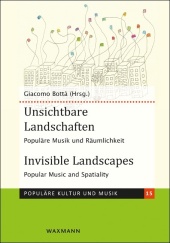 Neuerscheinungen 2016Stand: 2020-02-01 |
Schnellsuche
ISBN/Stichwort/Autor
|
Herderstraße 10
10625 Berlin
Tel.: 030 315 714 16
Fax 030 315 714 14
info@buchspektrum.de |

Giacomo Bottà, Thomas Burkhalter, Christina M. Heinen, Fernand Hörner, Meri Kytö
(Beteiligte)
Unsichtbare Landschaften / Invisible Landscapes
Populäre Musik und Räumlichkeit / Popular Music and Spatiality
Herausgegeben von Bottà, Giacomo; Mitarbeit: Bottà, Giacomo; Burkhalter, Thomas; Heinen, Christina M.; Hörner, Fernand; Kytö, Meri
2016. 204 S. 235 mm
Verlag/Jahr: WAXMANN VERLAG GMBH 2016
ISBN: 3-8309-3039-9 (3830930399)
Neue ISBN: 978-3-8309-3039-6 (9783830930396)
Preis und Lieferzeit: Bitte klicken
This is a multilingual volume, written by a group of transnational scholars, with chapters in German and English. It comprises chapters about heterogeneous popular music practices, largely, but not exclusively, from Europe. Addressing the relation between popular music practices and political struggles, postcolonialities, dense and layered urban settings and a certain understanding of cultural heritage, this volume turns noise into sound, revealing the invisible landscapes of Europe.
Popular music is as much about places as it is about sounds.
Its production is forged in studios, rehearsal areas and bedrooms, places often mythologised in popular music history. Popular music is also recorded using studio techniques designed to recreate space, through reverb and other effects. Its collective consumption happens in concert halls, clubs and bars while its individual consumption takes place in streets, homes and at bus stops; all physical places. In addition, popular music often represents or sounds like certain urban or rural, real or imagined places of various scales. These places are often invisible, intangible and hidden behind the music, or recreated on record covers and music videos.
This is a multilingual volume, written by a group of transnational scholars, with chapters in German and English. It comprises chapters about heterogeneous popular music practices, largely, but not exclusively, from Europe. Addressing the relation between popular music practices and political struggles, postcolonialities, dense and layered urban settings and a certain understanding of cultural heritage, this volume turns noise into sound, revealing the invisible landscapes of Europe.


